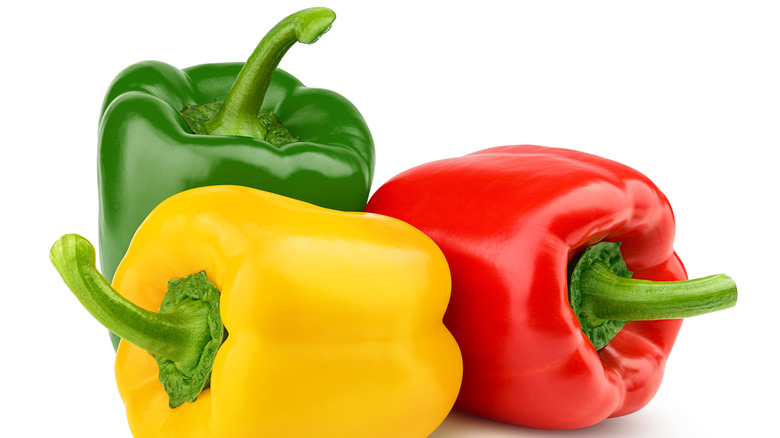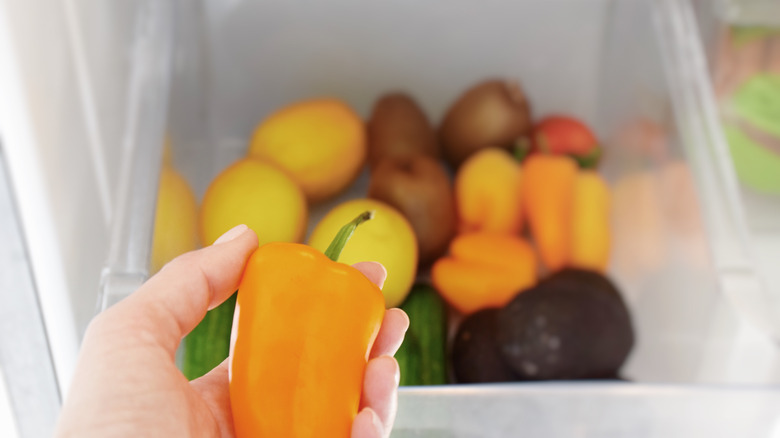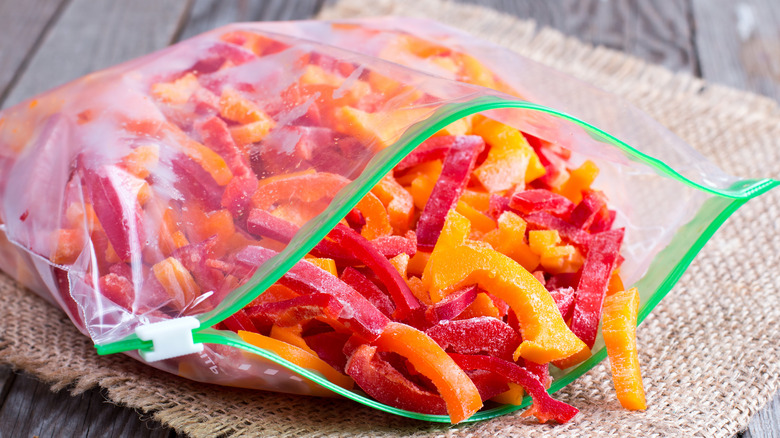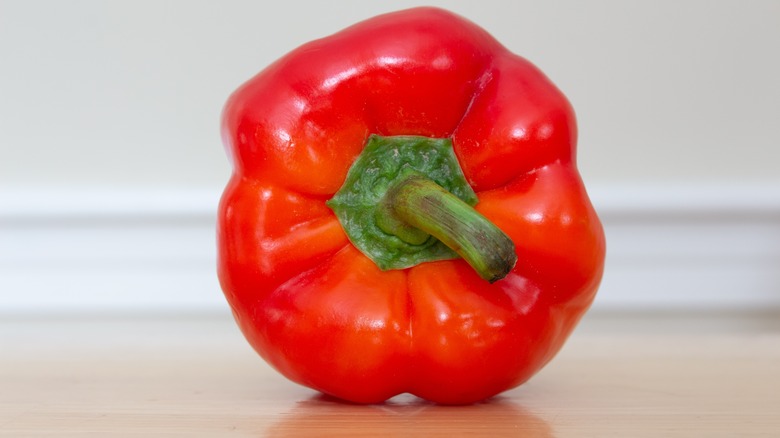The Absolute Best Ways To Keep Bell Peppers Fresh
Bell peppers help create some of the most delicious meals enjoyed by people around the globe (via World Crops). According to the American Chemical Society, they are the only pepper variety that doesn't produce capsaicin. This chemical gives peppers their hot, spicy characteristics. Since bell peppers are mild in flavor, they can be consumed raw, cooked, and tossed atop pizzas, salads, and soup and casserole recipes.
Bell peppers are rich in nutrients, such as vitamin C (via Healthline). They must be stored properly to maintain their wholesome composition, fresh, crisp flavor, and vibrant color. The NCHFP recommends choosing firm, brightly colored bell peppers when selecting your veggie. Do not choose peppers that are soft or unhealthy in appearance.
If you find that you've purchased too many bell peppers, don't fret. There are several ways you can keep the colorful fruits fresh and edible. Here's what you need to know about storing fresh whole and sliced bell peppers:
Store bell peppers in the refrigerator
Lacademie says that whole bell peppers remain fresh for up to two weeks when stored in the fridge's crisper drawer. The site recommends cleaning the bell peppers and ensuring they are completely dry before placing them in a reusable mesh or disposable plastic bag. Leave the bag open to allow the peppers to "breathe," and simply place them in the crisper drawer.
Ensure that you remove any old or rotten fruits or vegetables from the bin at the first sign of spoilage. This prevents the fresh peppers from spoiling prematurely. According to Penn State University, as fruits and vegetables mature, they emit ethylene gas which speeds up the ripening process. Moldy fruits and vegetables emit more gas than fresh ones. So, the ethylene concentration in a crisper drawer is higher when ripe fruits and vegetables are left in a drawer with fresh ones. That one moldy veggie will affect the entire rest of the bunch.
Did you slice and dice too many bell peppers? Sliced bell peppers should be stored differently than whole peppers. According to Live Simply, leftover bell pepper slices can be kept for up to seven days in a plastic freezer bag or air-tight container lined with a paper towel. The paper towel helps to absorb excess moisture from the bell pepper. Maintaining a dry environment when storing bell pepper slices is crucial to prevent moldy bell peppers.
Store bell peppers in the freezer
Master Class recommends flash-freezing bell peppers for an hour before storing them in the freezer. You can do this by slicing the peppers into strips and laying them in a single layer on a baking sheet. Freeze the peppers for about an hour, put them in a plastic freezer bag, and remove the excess air; seal, and place the bag in the freezer.
Need to freeze whole bell peppers? The Spruce Eats recommends removing the stem, top, and seeds from the peppers, then replacing the tops. Next, wrap the bell peppers in plastic wrap, place them in resealable plastic bags, and pop them into the freezer. Frozen bell peppers can last up to six months in the freezer, so label each bag with the future six-month date. The Spruce Eats says to toss frozen bell peppers if they have freezer burn, feel mushy, if the bag contains excess air, or if the six-month "use-by" date has passed.
Store bell peppers on the counter
If you have plans for your bell peppers, you'll probably use them within a day or two. In this case, they can be kept on the counter for several days at room temperature. Store them inside the produce bag in a cool, dry kitchen area to prevent decay. Martha Stewart says that fresh, whole bell peppers will last up to five days on the counter, but they remain fresher for longer when stored in the fridge. Can't keep your peppers in the refrigerator? Maddy Rotman, head of sustainability of Imperial Foods, says, "the pantry or a cabinet shelf is the best alternative." (via Matha Stewart)
Bell peppers are crunchy, robust, colorful fruits that spice up your menu. Their unique flavor adds a distinct sweet or bitter, earthy flavor, depending on the variety. If you find yourself with an abundance of bell peppers, store them properly to ensure they retain their delicious taste and remain safe to consume.



